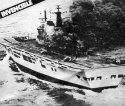b787
Captain
you are saying things without logic, you are saying your politicians were liars, the 200 mile TEZ was no true, it was not like that, in wars there are basic rules"The 200 mile TEZ was a political invention indeed, NEITHER asked for by the RN or given any real importance by either side's armed forces. The Argentine Leadership at the time have said then and since they did not place any significance on the TEZ, neither did Adm Woodward and his staff. As far as both sides were concerned, the entire South Atlantic was a war zone and any forces belonging to the other side were fair game. This was acknowledged several days earlier by the Argentine Government. The TEZ was dreamt up by politicians without regard to any Military advice, and was a source of irritation to both sides. At no time was it ever stated that Argentine forces outside the zone would be safe from attack, or given fair warning prior to an attack. The Belgrano's Captain, Hector Bonzo, stated he knew his ship was at risk from attack, and also acknowledged his ship was in a holding pattern at the time it was sunk, NOT heading back to port. His ship, by his own admission, was a legitimate target, and you dishonour the members of his crew lost in the sinking by suggesting otherwise. They were not innocent victims murdered without warning, they were brave warriors who fell in battle, and should be remembered as such."
Correction of my earlier post. One word can make a lot of difference.
A correct legal analysis of the question arises because it considers that article 51 of the Charter of the United Nations prohibits the use of force except in self-defense.
The United Kingdom had recognized the legal validity of this prohibition not only at the time of the elaboration of resolution 502 of the organism, process in which it had a leading role, but expressly expressing, at the time of sending its task force, that it acted in observance and On the basis of the aforementioned rule.
In these terms, the justification for the collapse of the ARA General Belgrano Cruiser can only show that it was an imminent threat to British forces.
In concrete terms, not through the generic rhetoric of the danger used in his letter by Admiral Molina Pico - and used by Margaret Thatcher (British Prime Minister) in his defense -, but to the fact that the Argentine cruiser was at a greater distance 400 miles from the bulk of the British forces and more than 250 miles from its nearest units, while the range of its cannons did not exceed 40 kilometers. And that he was sailing at a speed of 11 knots to the island of the States; That is to say that it was not heading either to the exclusion zone or to the British units
The British, not only lied about the exclusion zone but also about the justification, since the Belgrano was not a threat to any British ship when it was sunk, so you whole argument show british double standards
The order to sink the Cruiser A.R.A. "Gral. Belgrano ", emanated directly from the former British Prime Minister Margaret Thatcher, involved the use of methods and means that caused superfluous ills and unnecessary suffering to its crew; No warning was given prior to the launch of the torpedoes, or ultimatum, the vessel was not considered to be a military danger, the HMS Submarine "Conqueror" left the area without attempting to rescue the shipwrecked, nor warn the Argentine ships that they could Assist them, or humanitarian agencies such as the International Red Cross.
He just walked away from the area at full throttle.
Although it was a military ship, the Cruise A.R.A. "Gral.Belgrano", because of its location, purpose, firepower, inferiority to the nuclear submarine that pursued it for more than thirty hours, can not be considered at the moment of its sinking as a precise military objective. Much less could be envisaged the limitation of their effects, which were terrible in human losses, and which could still have been greater, were it not for the skill of their crew.
Last edited:



